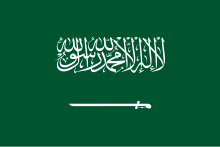Saudi Arabia at the 2016 Summer Olympics
| Saudi Arabia at the 2016 Summer Olympics |
|||||||||
|---|---|---|---|---|---|---|---|---|---|
 |
|||||||||
| IOC code | KSA | ||||||||
| NOC | Saudi Arabian Olympic Committee | ||||||||
| Website |
olympic |
||||||||
| in Rio de Janeiro | |||||||||
| Competitors | 11 in 5 sports | ||||||||
| Flag bearer | Sulaiman Hamad | ||||||||
| Medals |
|
||||||||
| Summer Olympics appearances (overview) | |||||||||
Saudi Arabia competed at the 2016 Summer Olympics in Rio de Janeiro, Brazil, from 5 to 21 August 2016. This was the nation's eleventh appearance at the Summer Olympics. Once again, as was the case for the first time in London four years earlier after pressure was brought to bear on the Kingdom, Saudi women were allowed by the Kingdom to participate.
The Saudi Arabian Olympic Committee sent a team of eleven athletes, seven men and four women, to compete in five different sports at the Olympics, doubling its female participation after two women attended the London Games four years earlier. Discus thrower Sultan Mubarak Al-Dawoodi, along with distance runners Moukhled Al-Outaibi and Sarah Attar, were the only Saudi Arabian athletes to have participated at the previous Games, with the rest of the field making their Olympic debut in Rio de Janeiro. Meanwhile, judoka Sulaiman Hamad (men's 66 kg) led the Saudi delegation as the flag bearer and team captain in the opening ceremony.
Saudi Arabia left Rio de Janeiro without a single Olympic medal, after failing to reproduce its performance from the previous Games due to the absence of the equestrian jumping team.
Saudi Arabian athletes achieved qualifying standards in the following athletics events (up to a maximum of 3 athletes in each event):
Saudi Arabia entered one fencer into the Olympic competition, returning to the sport for the first time since 1992. Lubna Al-Omair was given an exceptional additional quota place by the "universality clause", promoting equality in the Olympics.
Saudi Arabia qualified one judoka for each of the following two classes at the Games. Sulaiman Hamad (men's 66 kg) earned a continental quota spot from the Asian region, as Saudi Arabia's top-ranked judoka outside of direct qualifying position in the IJF World Ranking List of May 30, 2016. Meanwhile, Wujud Fahmi (women's 52 kg) received an exceptional additional quota place under the "universality clause" by the International Olympic Committee.
Fahmi was accused by Israeli media of purposely forfeiting her match in order to avoid competing against Israeli judoka Gili Cohen in the second round. Fahmi, Saudi Arabia's news agency Al Arabiya, and the Saudi Olympic delegation said that Fahmi forfeited because she received injuries to her hands and feet in training. However, other media outlets, such as Israel Channel 2, reported she was not injured. Jim Nieto, the martial arts instructor who coached her before the Olympics, said it seemed fishy that she, after taking part in the Opening Ceremony, was reportedly injured so close to her fight date, because top competitors generally don't fight the day before their competition. He said "I feel sorry for her. Let her fight — even if she lasts 10 seconds. She busted her butt for almost a year to get there."
...
Wikipedia
